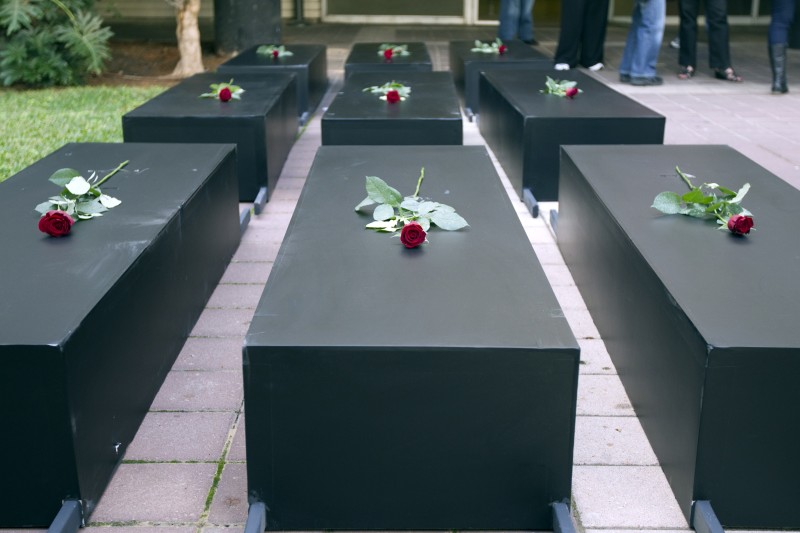"Absolutely," he said. "If it helps one guy in here, it's done its job."
The classes are being offered in English and Spanish through San Francisco-based Futures Without Violence, which works to prevent domestic and sexual violence and child abuse. Instructors arrived with slide projectors and passed out business cards to the players.
"We're very proud to have been selected by both Major League Baseball and the Major League Baseball Players Association to develop a comprehensive strategy to educate and engage players in positive solutions to prevent and end domestic violence, sexual assault and child abuse," said Esta Soler, the organization's president. "Their dual commitment to these issues reminds everyone that violence against women and children affects all of us, and that we can all be part of the solution."
Futures Without Violence senior vice president Rachael Smith Fals was in Arizona to help present the workshops, and she told KQED the first day exceeded everyone's expectations.
"The reception from players, the level of interaction and conversation was really positive," she said. "Every session is players only. There's no coaches, there's nobody from the league. These are topics these guys are curious about, that they want to talk about. They all have people in their lives they care about."
Fals said the Futures Without Violence curriculum, which they developed in collaboration with Northeastern University's Center for Sport in Society, emphasizes prevention.
"We're not just talking about consequences and what happens if you do something wrong," Fals said. "The point of this is to help you have better relationships in your lives. And yes, you need to understand the impact of trauma and abuse in order to appreciate what victims go through. But our whole motive here is to prevent that from happening in the first place."
Role of the 'Upstander'
"These guys are coming together and some of them don't know each other that well yet," she said. "The idea at spring training is really to build cohesion and trust and accountability among them as a team. We talk about 'the bystander' often -- what's the role of a bystander? -- but we try to focus on the 'upstander.' What you can do to stand up for someone you care about, and if you see something that you think is maybe not appropriate or good for your teammate, here are some resources, here are some strategies."
Fals said the league and the players union have also set up a phone hotline, in English and Spanish, for partners and families of players as well as the athletes themselves.
Oakland's players who speak Spanish as their first language opted to listen to the workshops in English, Otero said, because they could understand the subject matter, which he said, "was actually nice having the whole team here as opposed to having half and half."
Tim Slavin, chief of business affairs of the Major League Baseball Players Association, also attended the session.
The San Francisco Giants and other Cactus League teams in Arizona also had classes scheduled Thursday.
Players and coaches said they appreciate baseball's efforts to educate, given the issues surrounding other major professional sports leagues.
"You're seeing it a lot in other sports. It's been in the news a lot," San Francisco shortstop Brandon Crawford said. "I feel like it hasn't been as prevalent in Major League Baseball, so it's nice we're doing something to help prevent it and keep us out of it a little bit more."
Even before the sessions began, union head Tony Clark said he heard encouraging feedback from players who were eager to hear more about the process.
"It's an opportunity for us to move forward in a very positive direction on a very challenging issue," Clark said Wednesday. "The steps that we have taken have been hugely beneficial. Awareness, prevention, education, understanding — those are all things that all of us are committed to, to make sure that we have an understanding of the challenges that exist and we work to address them on the front end as best we can.
"So, I think the education sessions that are going to happen during the course of this first week at ballparks here and Florida, and those that are involved and committed to that process and education, believe it's positive. We believe it's positive."
Importance of Being Proactive
Giants manager Bruce Bochy and his coaching staff, and also members of the team's front office, were prepared for a long day at Scottsdale Stadium. Their session was scheduled for late afternoon, following the players' classes.
"We do appreciate it. The fact that we are being proactive, I'm sure like the other sports, that's a good thing," Bochy said. "It's something that should happen. It's time to help educate everybody."
Fals of Futures Without Violence said her organization has been working with the Giants for many years. "They've been in front of this issue for a long time, and we've had the opportunity to try different approaches in terms of education, community engagement, fan awareness."
Like the Giants coaches, A's manager Bob Melvin had a session scheduled for later in the day.
Melvin appreciates the efforts.
"Certainly we support that," Melvin said. "With all that's going on in sports and really in everyday life these days, it's something that needs to be addressed, and if we can school our guys and make them very aware of it, you try to combat the problem."
